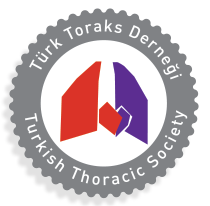Abstract
Abstract
Most of the acute phase reactants do not reflect the inflamation in community acquired pneumonia (CAP) with a sufficient specifity and sensitivity. In clinical practice, on the other hand, acute phase reactants have never been used to determine the severity of the disease. In addition to these, acute phase reactants are considerably insufficient to discriminate CAP caused by bacteria from CAP caused by viruses. Recently, there are studies suggesting PCT, considered as an acute phase reactant, might be used to detect the inflamation in CAP, to determine the severity of infections and to discriminate bacterial from viral infections. The aim of this study was to determine the efficacy of serum PCT levels for detecting the inflamation caused by CAP and to compare the efficacy of PCT and other acute phase reactants, to investigate a relationship between radiological extention score and acute phase reactants, and to determine the efficacy of acute phase reactants in discriminating patients with bacterial agent identified CAP from patients with bacterial agent unidentified CAP. 35 patients with CAP and 35 healthy controls of matched age and sex were included into this study. The efficacy of PCT and other acute phase reactants in detecting the inflamation in CAP was investigated. Patient group was divided into two subgroups as agent identified CAP and agent unidentified CAP. These two subgroups were compared for PCT, acute phase reactants, clinical parameters and radiologic extent of the disease. Correlations between serum PCT levels and other acute phase reactants and radiological extent of the disease were investigated. Serum CRP levels had the highest sensitivity and specifity for detecting the inflamation in CAP. Causative agents were detected in 17 of 35 patients. There were statistically significant differences of serum PCT levels, serum albumin levels and radiologic extent of the disease between patients with agent identified CAP and patients with agent unidentified CAP. Serum PCT levels had the highest sensitivity and specificity to discriminate agent identified CAP from agent unidentified CAP. Our study suggests that to detect the inflamation in CAP, serum CRP levels has higher sensitivity and specificity than serum PCT levels. However serum PCT levels has higher sensitivity and specificity than serum CRP levels to discriminate agent identified CAP from agent unidentified CAP. Furthermore, this study suggests that serum PCT levels may reflect severity of disease in patients with CAP.



